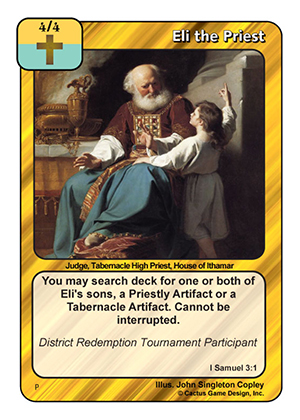Justice and mercy are pretty straightforward concepts we are all familiar with. However, when we are actually confronted with justice, we tend to confuse the two in an attempt to replace the justice with mercy. If you have kids, you know precisely what I am talking about. My oldest is my 6-year-old son, Antony. Like all 6-year-olds (and most adults), he is quick to demand justice if he is wronged. However, he might feel that he is owed some mercy when he is naughty. We are revisiting the story of Eli’s sons, Hophni and Phinehas and we will be confronted with a very uncomfortable realization of justice as defined by God’s law and gain a better appreciation for the boundless depths of His mercy toward us.
If you haven’t read part 1, you should do that now. The passage for this study takes place right after Eli confronts his sons over their wicked behavior (compounded in its vileness since they are priests). They will not repent and now we see the proclamation of God’s justice announced to Eli in 1 Samuel 2:27-36.
“Then a man of God came to Eli and said to him, “This is what the Lord says: ‘Did I not indeed reveal Myself to the house of your father when they were in Egypt in bondage to Pharaoh’s house? 28 Did I not choose them from all the tribes of Israel to be My priests, to go up to My altar, to burn incense, to carry an ephod before Me? And did I not give to the house of your father all the fire offerings of the sons of Israel? 29 Why are you showing contempt for My sacrifice and My offering which I have commanded for My dwelling, and why are you honoring your sons above Me, by making yourselves fat with the choicest of every offering of My people Israel?’ 30 Therefore the Lord God of Israel declares, ‘I did indeed say that your house and the house of your father was to walk before Me forever’; but now the Lord declares, ‘Far be it from Me—forthose who honor Me I will honor, and thosewho despise Me will be insignificant. 31 Behold, the days are coming when I will eliminate your strength and the strength of your father’s house, so that there will not be an old man in your house. 32 And you will look at the distress of My dwelling, in spite of all the good that I do for Israel; and there will never be an old man in your house. 33 Yet I will not cut off every man of yours from My altar, so that your eyes will fail from weeping and your soul grieve, and all the increase of your house will die in the prime of life. 34 And this will be the sign to you which will come in regard to your two sons, Hophni and Phinehas: on the same day both of them will die. 35 But I will raise up for Myself a faithful priest who will do according to what is in My heart and My soul; and I will build him an enduring house, and he will walk before My anointed always. 36 And everyone who is left in your house will come to bow down to him for a silver coin or a loaf of bread and say, “Please assign me to one of the priest’s offices so that I may eat a piece of bread.”’”
1 Samuel 2:27-36
Verses 27-30 outlines the unmerited grace that God has demonstrated to the tribe of Levi (the house of priests) and how Eli & sons have repaid that goodness. Upon first reflection, it might strike you as odd that the card, Eli the Priest (Promo), allows you to search for Hophni and/or Phinehas since they are both evil characters! However, reading this passage makes it clear that that the special ability reflects a failing of Eli—the fact that he honored his sons more than God. He did this by allowing his sons to remain priests while they defiled that position and dishonored God.
Verses 31-36 outlines the curse on Eli and his lineage (potential for a new curse card?), and these are the verse we will wrestle with. Part of this curse is where Phinehas gets his special ability: if both he and Phinehas are in battle, everything in battle gets discarded. Just like the confirmation of God’s justice against Eli’s house; his two sons would die on the same day. Eli gets justice—check. His wicked sons get justice—check. The unborn descendants of this family line get justice—wait, what? Reread verse 32-33 and we’ll see that “all the increase” (offspring) of Eli will receive this justice. This rubs us the wrong way and conflicts with our definition of justice. After all, what did they do and why should they get punished for the actions of Eli, Phinehas, and Hophni?
Before we shout, “That’s not fair!”, we need to check our definition of guilt, innocence, and justice against Scripture. Psalm 51 is the contrite cry of repentance of King David after he was convicted of his sin of adultery with Bathsheba and the murder of her husband to cover it up. David says:
“Behold, I was brought forth in guilt, and in sin my mother conceived me.” Psalm 51:5
David is not saying that he was illegitimately born as the result of his parent’s sin—he is saying that since the moment of conception, he had a nature of sin. Ever since the fall of man, every human being has been born with this sin nature which makes us unable to live in obedience to a perfectly holy God. This means—and pay careful attention—God does not owe any of us anything. Actually, I will revise that statement. The only thing God owes us, is justice for our sin and rebellious nature against Him. Our definition of “fair” may not be in line with what the Bible reveals as the justice and holiness of God. The only thing “unfair” about the justice on Eli’s house is that any of the—or us for that matter—were allowed to live at all. We are not owed even our next breath.
Conclusion & Application
The next time our knee-jerk reaction causes us to blurt, “that’s not fair!”, let us remember that we actually don’t want what would be fair. We do not want God’s justice executed against us; we want His mercy. In fact, the moment that someone is owed something, by definition it cannot be considered mercy. Only justice is owed; mercy is granted. It was even a display of His mercy that Hophni and Phinehas got to live any life at all and enjoy the wonders of God’s creation instead of being snuffed out immediately as they deserved. By our very natures which are hostile and rebellious against God, we deserve justice right from the start. However, if we understand the utter hopelessness of our state before God, we can then begin to glorify God for the mercy he shows us. The greatest expression of this mercy was in Jesus who died to take the punishment for you and I. God’s justice doesn’t allow Him to just sweep our sin under a cosmic rug, but He dealt with it by making sure that the price for our sin was paid with the very blood of Jesus. Praise God for His justice and mercy colliding in such glorious fashion!
To buy singles, sealed product, and other gaming supplies mentioned, please visit Three Lions Gaming!

